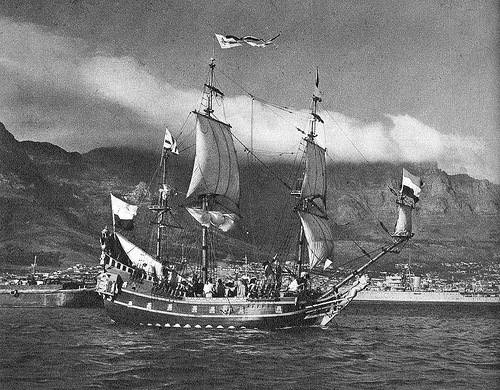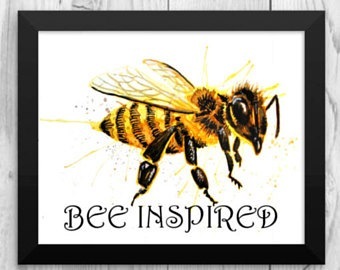Afrikaans: A Short History...Of Sorts

Afrikaans is my home language. Spoken by twenty million people, here is the “alternatiewe storie van Afrikaans”….
During the middle 1600’s, the Dutch East India Company was the major trading company in the world. It competed at the time with the likes of Apple, which sold apples, Shell Oil which unsuccessfully tried to extract oil from seashells, and Google which then consisted of a few library helpers scampering around.
The sea voyage from Europe to the east was long and perilous and the company, assisted by the consultancy Quo Vadis, decided to establish a halfway refreshment post. The location chosen was the southern tip of Africa.
A Dutchman by the name of Jan van Riebeeck was plucked from his thriving cheese-producing business, and given the dubious honor of establishing the outpost in what was to become South Africa. But first he had to find the place, as he could not read the maps of the Portuguese who had merrily sailed around the southern tip of Africa on leisure cruises years before. Van Riebeeck took a map-reading course, passed “com distinção” and set sail.
Almost a year later and Van Riebeeck was nearly blown off his ship by the stormy seas and wind gusts when he finally found the southern tip of Africa. He reported back to his superiors “dat plek zijn niet zo leuk” and called it the Cape of Storms. Company HR would have none of it, saying the name would jeopardize morale, and management with the help of its spin doctors renamed it the Cape of Good Hope.
This was 1652 and the little Dutch speaking colony slowly grew bigger in the following years. News traveled back to the Netherlands that the Cape was after all quite a nice place. Travel agents wasted no time advising their bored, middle-aged, wealthy clients to take an adventure tour to “Zuid-Afrika”. Soon more Dutch, laden with cheese, tulips and ill-fitting klompen found the Cape too good to go home and settled here.
Much to the delight of the Dutch East India Company there was a burgeoning demand in Europe for goods from the east branded “Made in China”. Image conscious teens could not get enough of the hot new ranges. The company share price skyrocketed and it avoided the worst effects of Tulip Mania.
Life was good in the Cape. The weather was mild, the beaches beautiful and the pace of life slow and leisurely; conditions lasting to this day.
Being far from the Netherlands, the thrill-seeking Dutch travelers, and displaced traders, sailors and company employees evolved their own version of Dutch, ingeniously calling it Dutch II. A dialect that to the uninitiated sounded like a diatribe.
Later arrivals from the Netherlands at the Cape could hear their home language was getting out of tilt: “goedemorgen” became “howzit” and “goedendag” became “cheers”. No wait…. this happened much later when Afrikaans adopted some of the English vernacular…I digress.
News of the great life in faraway Africa attracted other nations. In 1688 A group of French Huguenots of protestant religion decided to move to the Cape. The group was amazingly prescient and foresaw the French Revolution coming in about a century from then, and opted to make their way to Africa, just to be safe. Still waving au revoir to France, the locals squelched their merci with little mercy by having them speak Dutch II. The locals did however take on the French penchant for wine making, a voitre s(hhh)ante!
Adventurous Germans came to this land and found it “wunderbar, wunderbar!” Some stayed, which is fortunate otherwise I would not be here writing this piece. Indonesians joined the fun too, although not as much as they were brought here originally to work on the lands and help in the homes.
Darwin himself traveled to the Cape. His nascent theory on “how things change and stay the same when they are not changing and not staying the same”, later shortened to the “theory of evolution”, took a serious setback when he came upon the mishmash of people with the noisy language. Sometimes there is also survival of the fishiest.
Afrikaans was born in 1875 when it was declared a new language. Derived mainly from Dutch with various European and Indonesian language influences, it took two centuries to evolve from Van Riebeeck’s first arrival in the Cape.
For the next century the traditionalists in vain tried to stop Afrikaans from being influenced by the British who flocked to South Africa when diamonds and gold were discovered. In no small part due to the many Afrikaans speakers declaring that they “like English deliciously much.”
Afrikaans today is a language rich with expression and character due to its many influences. It is spoken by people of all creeds. For many it is their second or third language and for more than seven million people in South Africa, Afrikaans is their home language.
Lastly, I say to you the reader: “buy a donkey”!
Please do not be upset as it is the English phonetic form of the Afrikaans words “baie dankie”, which means…
...thank you very much.
"
Articles from Gert Scholtz
View blog
Pascal Derrien · is one of the few Irish Bees here on BeBee. He joined around the same time as I did ...

I looked back at · a series of interviews Sara Jacobovici did last year with a few Bees. At the end ...

I never realized how experienced and knowledgeable Jerry Fletcher is until this interview. · He join ...
Related professionals
You may be interested in these jobs
-

Store Manager
Found in: beBee S2 ZA - 6 days ago
Pepkor Speciality Gauteng, Johannesburg, South Africa Full timePepkor Speciality's job vacancy, Career and Recruitment · Job title : Store Manager – Bedfordview jobs in Gauteng · Job Location : Gauteng, Johannesburg · Deadline : May 12, 2024 · Quick Recommended Links · Jobs by Location · Job by industries · Job Description · Maximize profi ...
-
sales administrator
Found in: Job Placements ZA C2 - 6 days ago
Michelle Taylor Recruitment Johannesburg, South AfricaExperience Requirements: · Min 2 years of experience in Sales Administration, Customer Service, or related roles · Proficient in MS Office, Excel & similar platforms, ability to type quickly and accurately · Experience in order processing / invoicing / account management, client ...
-
Sales Engineer
Found in: Whatjobs ZAC2 - 3 days ago
Accountancy Placements Pietermaritzburg Durban, South AfricaResponsibilities:Responsible for marketing and growing the business to a new and existing customer base through selling a range of products and packaged solutions · Perform market analysis to identify gaps · Developing and organizing sales-related processes and activities (networ ...



Comments
Graham🐝 Edwards
7 years ago #13
Gert Scholtz
7 years ago #12
Gert Scholtz
7 years ago #11
Gert Scholtz
7 years ago #10
Lisa \ud83d\udc1d Gallagher Thanks you Lisa and to you I say Lekker Naweek which means have a good weekend!
Gert Scholtz
7 years ago #9
Gert Scholtz
7 years ago #8
Dean Owen Ek is bly (I am happy) that you stopped by Dean! You will have to come to SA to try out the Indonesian food yourself - as long as I can be host.
Lisa Gallagher
7 years ago #7
Ian Weinberg
7 years ago #6
Paul Walters
7 years ago #5
Ken Boddie
7 years ago #4
Dean Owen
7 years ago #3
Gert Scholtz
7 years ago #2
Pascal Derrien Thanks for "getting off the boat" at the post and an Afrikaans cheers to you Pascal :)
Pascal Derrien
7 years ago #1